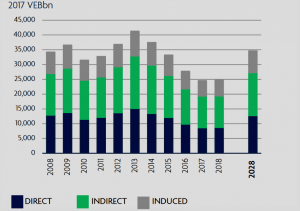Venezuela’s Crypto Tourism Bid, Paraguay OKs Huge Mining Project
Venezuelan president Nicolás Maduro has announced beach-loving tourists to the country will now be able to settle their bills in cryptocurrencies.

State media quotes Maduro as stating that the ruling applies only to certain “economic zones,” including tourist hotspots including beaches in the northern state of Falcón, the Margarita and La Tortuga islands, and the Archipelago de Los Roques.
Maduro stated that the national currency, the bolivar, would no longer be accepted in these areas, and that “all services provided, from plane fares to hotels, boat trips, food and souvenirs” would be obliged to process payment either in conventional international fiats or “particularly” what Maduro called “global cryptocurrencies” – presumably widely accepted digital tokens such as Bitcoin, Litecoin and the like.
Total contribution of travel and tourism to GDP of Venezuela:

Venezuela’s economic crisis continues to deepen, with hyperinflation driving down the value of the bolivar. The government has attempted to fight back by issuing a state-backed cryptocurrency, the Petro, backed by its oil reserves. Demand for Venezuelan oil has fallen dramatically in recent years, causing financial mayhem in a country that gains most of its income from crude exports.
Elsewhere in Latin America, while Chinese and Russian miners are reportedly shutting down their rigs en masse, the government of Paraguay is bucking the trend by green-lighting to what will become “the world’s largest mining farm in terms of area,” per the International Business Times.
The new facility, being built in conjunction with a South Korean initiative, will cover 50,000sqm of land adjacent to the Itaipu Hydroelectric Dam. The power plant increased its capacity to 103 TWh in 2017. Paraguay is known to have an energy surplus, exporting some 90% of the power it produces to Latin American and Oceanic nations. Some 70% of Paraguay’s energy is generated at hydroelectric plants.




